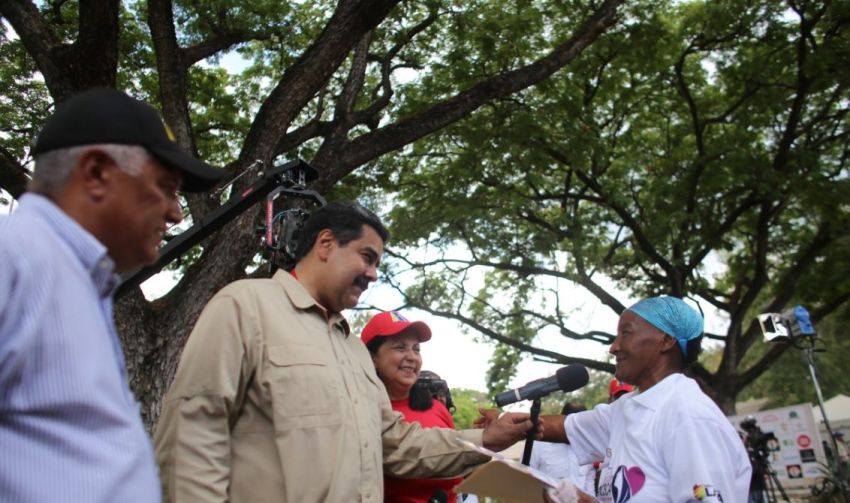
Incumbent presidential candidate Nicolas Maduro prioritised visits to dissatisfied campesino communities over April 28-29 as part of a campaign strategy aimed at shoring up support in rural communities that have traditionally voted overwhelmingly for both ex-president Hugo Chavez and Maduro.
The countryside represents a critical constituency for the government in the upcoming May 20 election.
There have been rising tensions in recent months between campesino communities and the state headed by Maduro, including ever more frequent violent evictions, persecution and electoral disputes.
During his visit to Carora in the rural western state of Lara on April 28, Maduro met with Angel Prado from El Maizal Commune, which is comprised of 22 communal councils located on the border between Lara and Portuguesa state.
Prado stoked controversy in last December’s municipal elections when he ran on a left-wing ticket without the backing of the ruling United Socialist Party of Venezuela (PSUV) and beat the government’s candidate with 57% of the vote.
He was, however, denied the position of mayor of Simon Planas municipality by the National Constituent Assembly on a bureaucratic technicality, causing tension between grassroots Chavista activists and the Bolivarian government.
El Maizal Commune, which supported Prado’s December candidacy, is one of the best organised in Venezuela, producing significant amounts of milk, corn and other agricultural products on previously abandoned land. It is working towards founding a communal city.
While in Lara, Maduro made no mention of the December elections nor Prado’s ongoing legal challenge to the result, though the encounter between Maduro and Prado is the first time the two have been seen side-by-side since the dispute erupted.
Before the visit, Maduro made a campaign stop in Merida state where he visited the El Vigia campesino communities, another site of recent friction between Chavista communities and the government.
In March, 32 campesinos were unlawfully imprisoned for 10 days after occupying idle land in El Vigia, prompting a popular outcry that ultimately led to their release.
Following the incident, Maduro announced an official shift in state policy, outlawing forced land removals and ordering preferential treatment for land arbitration cases involving productive campesino communities.
In another instance of the government responding to campesino grievances, the National Land Institute (INTI) recently handed over 2733 hectares of disputed land to previously persecuted rural communities in Barinas state. The communities are looking to develop agricultural and cattle farming on the previously unproductive land.
The section of the Gavilan-La Chaqueta farm was taken over by rural workers two years ago with an eye to producing in the fertile area in accordance with Venezuela’s land reform legislation. This law empowers campesinos to legally occupy idle private land and put it to use.
However, at the behest of local landlords, more than 100 campesinos involved in the occupation were violently evicted and arrested by authorities in February. They were released in March following grassroots pressure.
The land hand-over signifies a significant victory for rural communities in Barinas.
These advances have been facilitated by the re-opening of talks between INTI, the Ministry of Popular Power for Agriculture and Land and campesino representatives from seven states on April 22, with the Gavilan-La Chaqueta land hand-over being the first concrete result.
[Abridged from Venezuela Analysis.]